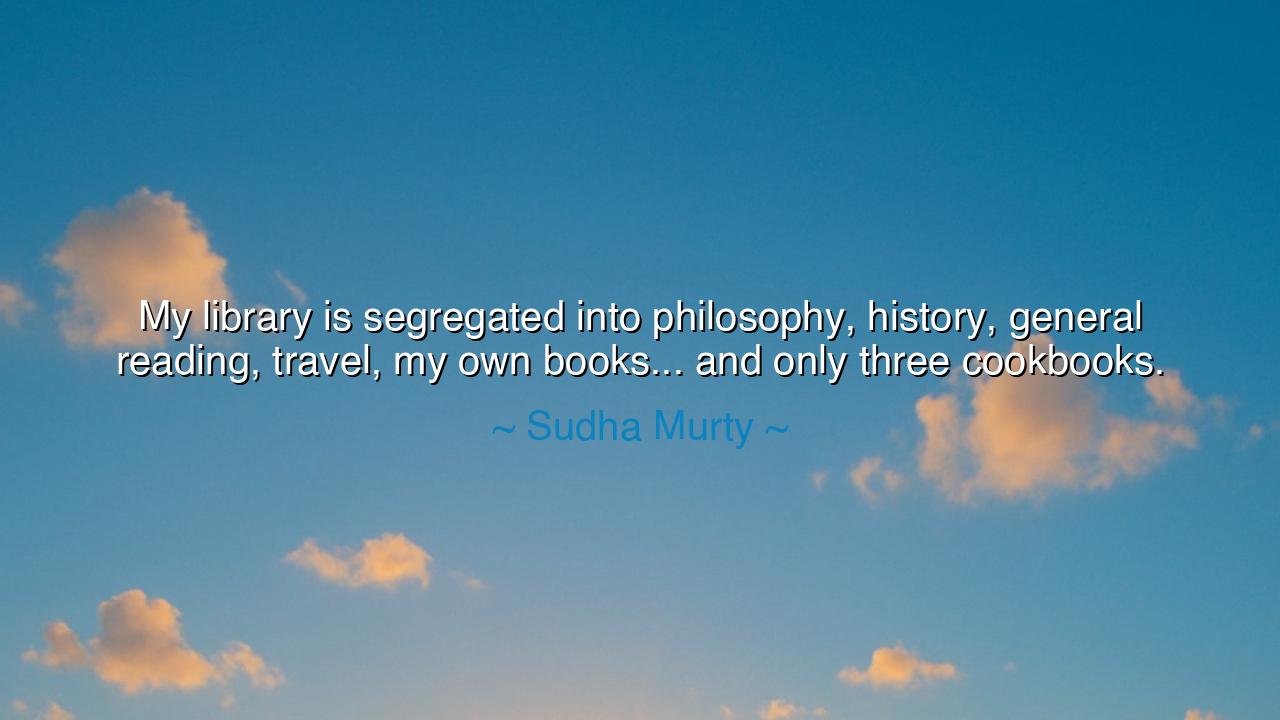
My library is segregated into philosophy, history, general
My library is segregated into philosophy, history, general reading, travel, my own books... and only three cookbooks.






When Sudha Murty, the wise writer and philanthropist of India, said, “My library is segregated into philosophy, history, general reading, travel, my own books... and only three cookbooks,” she revealed not just the arrangement of her shelves, but the architecture of her mind. In these gentle words lies a vision of what nourishes the soul. Her library is not merely a collection of paper and ink — it is a reflection of life itself, a map of thought and experience, arranged with care and humility. Each shelf stands for a different realm of human understanding — philosophy for wisdom, history for memory, travel for exploration, and general reading for wonder. And then, with disarming simplicity, she adds, “...and only three cookbooks” — a touch of humor, but also a deep reminder that while the body must be fed, it is the mind and heart that truly sustain us.
The origin of this quote lies in Sudha Murty’s reflections on her lifelong love of learning and reading. As a woman of intellect and compassion, she has spent her years not in luxury but in service — teaching, writing, and uplifting others through education. Books have been her companions through every season of life, and in this small confession about her library, she shares the balance of her pursuits. There are many who collect possessions; she collects wisdom. Her words remind us that a library — like a person — reveals what one values most. And though she smiles at her “three cookbooks,” the statement reveals a truth about priorities: that life’s richness is not found in indulgence, but in understanding, in feeding the inner hunger of the spirit.
Each category she names is a pillar of the human journey. Philosophy teaches us how to live; it is the mirror of the mind, showing us the nature of virtue and the measure of meaning. History reminds us where we come from, so that we may not repeat the follies of the past nor forget the courage of those who came before. Travel opens our eyes to the vastness of the world, humbling us before its diversity and beauty. General reading — the stories, poems, and letters of countless voices — gives color to the soul, teaching empathy and imagination. And among these stands one small shelf of her own books, a symbol of contribution — for wisdom hoarded dies, but wisdom shared gives life.
The remark about “only three cookbooks” seems light, yet it carries an ancient truth: that moderation in the pleasures of the flesh allows greater devotion to the pursuits of the spirit. The ancients taught that the body is the vessel of the soul, and while it must be tended, it must not be worshipped. Sudha Murty’s library is a parable of this principle. To cook, one needs nourishment; to live, one needs meaning. Her three cookbooks are enough to sustain the body — the rest of her shelves sustain the mind. In an age where consumption is endless, her restraint is revolutionary. She reminds us that simplicity is not deprivation, but freedom.
Consider the example of Mahatma Gandhi, who too was a lover of books, yet lived with few possessions. His library contained works of philosophy and religion, writings that inspired action and reflection. It was not the size of his collection that mattered, but the depth of his engagement with it. From those pages came his understanding of truth and nonviolence, ideas that reshaped the destiny of nations. Gandhi, like Murty, understood that reading is not an escape from life, but a return to it — that in the quiet companionship of books, one finds the wisdom to act rightly in the world.
Murty’s quote is also a reflection of discipline and harmony — the discipline to curate what enters her mind, and the harmony to keep her knowledge in balance. To segregate a library is to bring order to thought, to recognize that learning has many faces. She does not drown in chaos but moves with intention through her intellectual garden, tending each section like a careful gardener. And in this order, there is peace — the peace that comes from knowing what to value, what to keep, and what to let go.
So, O seeker of truth and learning, take this wisdom to heart: build your own library not with abundance, but with purpose. Fill your shelves — and your days — with that which uplifts, challenges, and enlightens. Read philosophy to strengthen your reason, history to deepen your memory, travel to widen your soul, and stories to awaken your compassion. Keep your cookbooks few, but your curiosity vast. For as Sudha Murty teaches, it is not the number of books, but the quality of their company, that shapes a mind.
And when you, too, arrange your shelves — whether they be of books or of experiences — do so as she does: with gratitude for the past, humility in the present, and joy in the pursuit of wisdom. For the true library of life is not only on paper, but within the heart — where every lesson, every journey, and every act of kindness becomes a living page in the eternal book of the soul.






AAdministratorAdministrator
Welcome, honored guests. Please leave a comment, we will respond soon